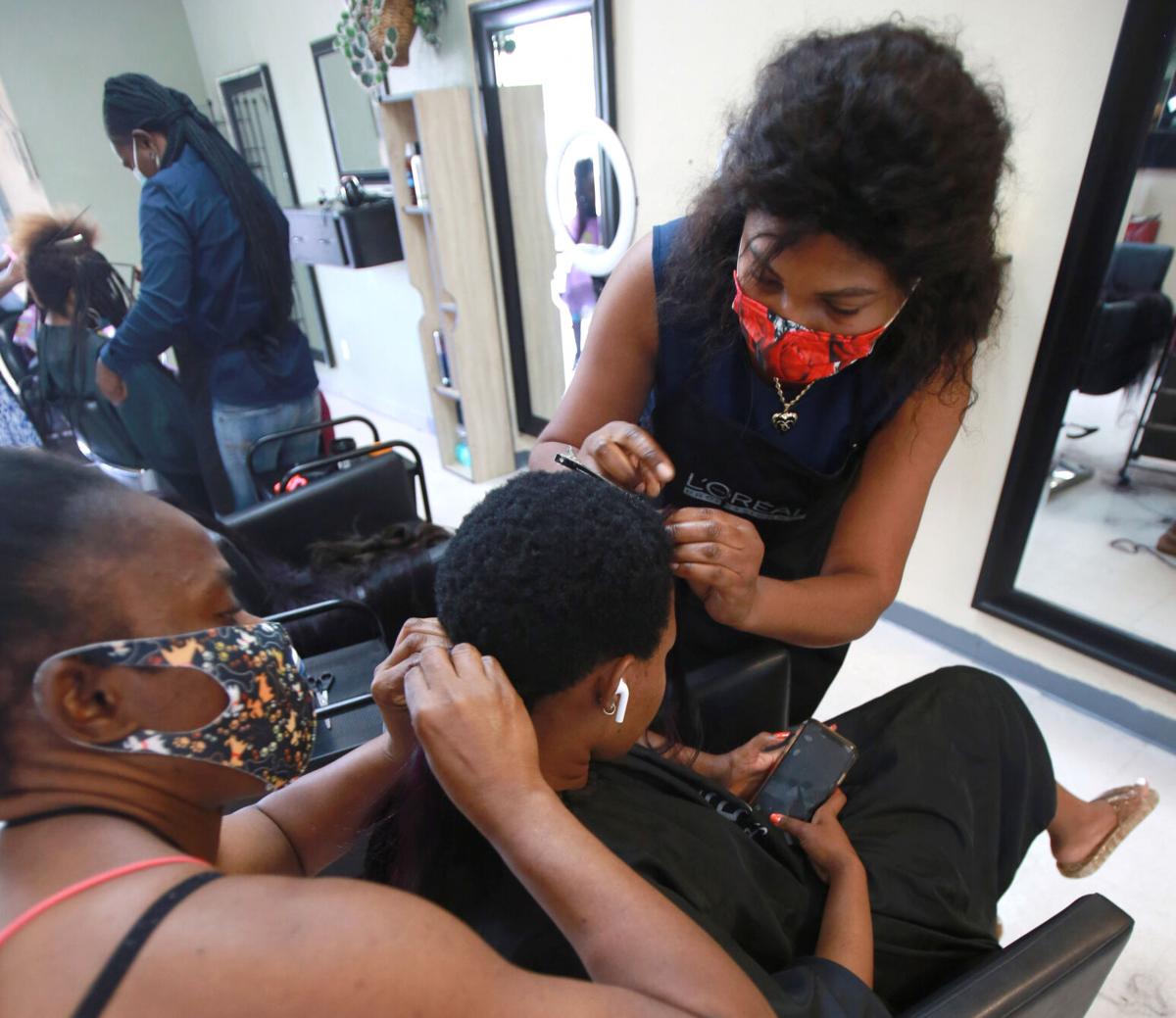
Hevie Magoundi, right, braids hair at Hevie’s Beauty Supply & African Hair Braiding that officially opens later this month.
When she was a young girl in Africa, escaping a civil war in the Republic of Congo and moving with her family to Gabon, Hevie Magoundi found peace and happiness braiding the hair of her Barbie doll.
She learned the art of African braiding from her older sister and was consumed by it — spending hours looking at her sister and learning techniques of the intricate designs. Some designs take up to six hours and can last three months while others can take two hours and last three weeks, said Magoundi, now a U.S. citizen.
“It all depends on the braid,” she said of the social art that can be traced back 5,000 years in African culture. The braid could indicate a person’s tribe or religion, age, wealth and social or marital status.
The art has been passed down through the generations, and now Magoundi wants to share the art with customers at Hevie’s Beauty Supply & African Hair Braiding salon. Her newly opened business is in Frontier Village shopping center at 3917 E. Pima St.
The grand opening of Magoundi’s salon is scheduled Oct. 18, but meanwhile customers are making appointments to get their hair braided after learning of Magoundi through word-of-mouth and seeing photos of her work online.
Women and men, young and old, Black, white and Latino come to the shop and spend hours while Magoundi braids their hair into styles including weaves, cornrows, box braids, kinky twists, Senegalese twists, single braids, crochet braids and dreadlocks. On weekends, she receives help braiding from her sisters, Lydiane Pamboud and Lalone Magoundi, and friends Arista Ngandzien and Emanuella Kpetsi.

Emanuella Kpetsi separates red hair for a box braid style during a busy Saturday at Hevie’s Beauty Supply & African Hair Braiding.
On a recent Saturday, gospel songs in French played in the salon while Magoundi secured one of many hair extensions on Ingabire Brenda’s natural hair and began forming the strands into box braids. Her and Ngandzien’s nimble fingers made the braiding look easy as both women took about five hours to complete the braids. Brenda said she liked her friend’s braids that were done by Magoundi, so she called for an appointment and became a client.
Magoundi also braided Yvonne Cadette’s hair into cornrows. It was her first time at the shop and she, too, was referred by a friend. Cadette broke out in smiles once Magoundi was finished with the hairstyle.
“I love braiding,” said Magoundi, a 36-year-old businesswoman who is living her dream of founding and operating a braiding salon. “I don’t get tired. I love making people look pretty.” She is working on investing more capital into the salon so she can fill empty shelves with hair products to sell, and she eventually wants to open a braiding school. “The art of braiding is very much alive, and I am here to help others learn,” said Magoundi, who was employed as a health-care worker and put money in savings for years before she opened her shop.
Also on this Saturday, Pamboud, Magoundi’s eldest sister, was styling box braids on Cheryl Redwine, a nurse at a rehabilitation facility who moved from Detroit to Tucson a month ago for the job. Younger sister Lalone Magoundi, a gospel singer who sings in French and Lingala, a language of Central Africa, was also helping braid Redwine’s hair.
“My dad used to have a lot of hair. He would comb it and let me braid it,” said Pamboud who was age 7 at the time. “That is how I learned to braid. Thank you daddy,” said Pamboud, 43. “I braided his hair for years, and then I braided my family’s hair,” she said, including her parents, three sisters and two brothers.
Pamboud passed on her talents to her sisters. “It is a gift. I know people go to school to learn braiding, but I was self-taught,” Pamboud said, explaining that her sisters also learned much on their own and all come up with styles and designs. Over the years they all have continued braiding, which has helped them with finances. Magoundi also worked braiding hair in a salon that a sister operated for 10 years in Bridgeport, Connecticut. That sister remains living in Waterbury, Connecticut.
Magoundi explained that she and her family escaped the civil war in Congo in the 1990s after her father, who worked for a transportation company, was targeted because he was a supporter of then-President Pascal Lissouba of the Pan-African Union for Social Democracy. Militias formed because members were dissatisfied with the 1992 general election and formed alliances against Lissouba.

Emanuella Kpetsi does some hair styling at Hevie’s.
“I don’t remember too much. But I do remember one day there were shootings in our neighborhood, and there was blood and people died. We ran from our neighborhood. Thank God we got out,” said Magoundi. At the time she was 12 years old, and the family fled as refugees to Gabon where they lived until 2005 before resettling in the historic seaport city of Bridgeport through the Connecticut Institute for Refugees and Immigrants.
At age 20 arriving in Bridgeport, Magoundi and the family struggled to fit into their new way of life. “It was very difficult in the beginning. We didn’t know how to speak English. People who spoke French (the family’s primary language) translated for us, and helped us find jobs and go to English classes,” she said of social services and programs offered by the institute for refugees and immigrants.
The family lived in a one-bedroom apartment and her younger siblings enrolled in school and the adults enrolled in English classes. Her parents found work in a warehouse at a socks factory, and Magoundi was employed in housekeeping at a hotel. She went on to a community college and enrolled in math and English classes before studying medical coding and billing at a career training institute. She did not find a job at clinics or hospitals, so she applied at an agency as a caregiver and worked with disabled clients.

On one recent Saturday, Hevie’s Beauty Supply & African Hair Braiding was booked up all day and required five braiders for its clients.
After two years, the family was able to rent a five-bedroom house, and Magoundi and her other sisters continued doing African braiding when not working at their full-time jobs.
In 2016 the harsh weather in Connecticut brought Magoundi, along with her parents and then later a sister to Tucson. They followed their older sister, Pamboud, and her family who moved here after visiting a relative. Tucson’s warm weather and cost of living compared to Connecticut was a godsend.
In Tucson, Magoundi continued working as a caregiver and saved money that she invested into the salon. “This is a dream come true to have my own small business and help others learn African braiding,” she said.
Contact reporter Carmen Duarte at [email protected] or on Twitter: @cduartestar






